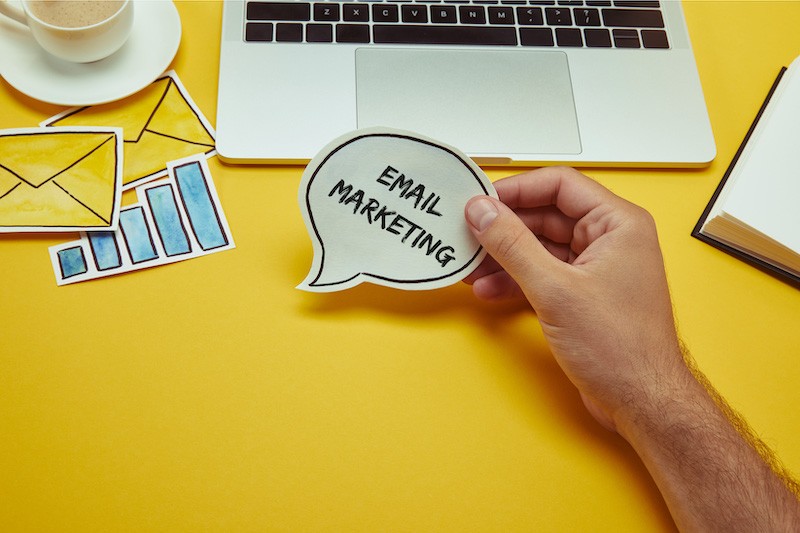Chances that if you’re looking to build a marketing strategy for your business, you’ve come across the marketing automation vs email marketing dilemma. Marketing strategies are critical to the success of any business endeavor. So, understanding the available marketing tools will expand your company and keep it growing for years to come. Email marketing and marketing automation are particularly lucrative tools because email significantly contributes to finding and retaining customers. Considering whether email marketing or marketing automation is most suitable for your business will be key to your marketing strategy.
Table of Contents
What is Email Marketing?
Email is an excellent channel to start with for its accessibility to new users, a direct contact channel for companies, and for its high return on investment rate ($36 return for each $1 invested). Email marketing means sending emails to a set mailing list. The list could consist of both prospective and current customers or partners. The emails, while being sent en masse, can also be personalized and your list can be sorted and organized to your preferences. The best way to implement email marketing is through an email marketing software, which is luckily one of more accessible and affordable business tools in the digital world.
What makes email marketing powerful is the opportunity to directly interact with your prospective and current customers. Emails can be sent to promote products/services and alluring promotions, to inform customers of changes or exciting events, build a community within your customers, or to send other forms of media from your company, such as newsletters.
Receivers of your email must do something with the message they have received. They could choose to read it, delete it, mark it as read. No matter what they do, they will have at the very least seen your company presence in their inbox.
What is Email Marketing Automation?
Email marketing automation is letting the software or program handle your email marketing. You can customize who receives the emails according to your preset conditions. For example, a new subscriber to your mailing list receives a welcome email, or a customer who has just placed an order receives a purchase confirmation. These automated emails are triggered by actions or can be timed. Email marketing automation takes the tedious email tasks off your hands. These activities include things like responding to customer questions and building relationships. Automating the email marketing process helps you stay on top of your mailing list even as your company grows.
Automatic Marketing Solutions
Marketing automation is exactly what it sounds like: automating communication and data collection of your marketing efforts. Like email marketing, automatic marketing keeps track of your mailing list’s activity with the email they receive, but it also does the same for social media, website landing pages, and advertisement campaigns. Marketing automation streamlines the monotonous marketing work across various platforms and lets you analyze how your audience interacts with your output, allowing you to create content that fits with what your customers want to see.
Marketing automation can also handle other tasks. It helps business development by helping you give leads the information they want, helping decrease leaks in your lead-to-customer funnel. Because you will be able to see how leads interact with your platforms, you can spot opportunities to streamline their interactions, allowing for more engaging and accessible use of your platforms. Parts of your workflow are also automated in tasks involving analysis, scheduling, budgeting, and asset management.

Comparing Email Marketing and Marketing Automation
Definitions
Email marketing is a tool, one that you use email marketing platforms to use and manage. Marketing automation is more of a concept. It’s the larger idea that parts of the marketing process can be automated. You use marketing automation through a platform or software. Email marketing is a tool that is seen as a part of marketing automation, but it can also be implemented separately.
Efficiency
The purpose of both email marketing and marketing automation is to help you streamline the routine marketing work required of your business. Having a tool or program to automate simple tasks allows you to free your time. Instead, you can build relationships with your leads while also collecting data on how leads interact with your interfaces and channels.
Tracking
Both tools track the data of email campaigns, but the information each provides is very different. Email marketing tracks what your email recipients do with their email: opening it, see if they clicked on anything and how often, and what percentage of email recipients did nothing.
Marketing automation software often just doesn’t track email activity. It tracks all of a lead’s digital interactions with your brand, including pages visited, downloads, and any other activity. Tracking all this information is incredibly difficult and time consuming by hand, so marketing automation becomes an attractive option for giving you all the data you need. You might also be able to collect IP addresses and any associated companies from your website traffic. This comprehensive tracking gives you a more holistic image of how leads interact with your digital presence.

Channels and Personalization
Email marketing focuses on one channel: email. Most email marketing platforms also allow for basic customization of messages to leads.
Marketing automation gathers data from and helps you manage multiple channels, including email, social media, and websites. Advanced marketing automation platforms also provide you with more customization. For example, adding messages and attributions to segments of your contact list, or timing material to different time zones.
Setup and Initial Effort
The initial effort for email marketing includes creation of company email addresses, creation and segmenting of the mailing list, setting up conditions that will trigger emails to be sent en masse (or the “batch and blast” method), and setting up analytics. Some email marketing platforms will allow you to customize messages that are sent out to different segments of the mailing list.
Marketing automation requires all those steps and also requires you to plan your campaigns, but it also provides you with more customization and personalization options. You can also use marketing automation to set up drip campaigns. Drip campaigns are emails that are sent out over time to leads, sometimes only following up on people who already engage with your material. You will also need to set up lead scoring, but the returns of that feature are great. It provides you data on lead behaviors and builds their data use profiles in real-time. Lead scoring helps the marketing team figure out which leads are worth following and attempting to convert into sales.
Locating Sources of Revenue
What marketing automation can do that email marketing cannot is provide you with the full picture of how a lead came to make a purchase. Email marketing at most can tell you if a lead clicks a purchase link. But if they have had other interactions with your business, then the information on how they came to make that purchase is insufficient. Marketing automation’s tracking of a lead’s digital footprint lets you see how the lead came to make their purchase. this gives you a greater understanding of lead behavior and paths to becoming paying customers. You will be able to see what parts of your marketing strategy are actually drawing in customers. From there, you can filter out the aspects that bring in less revenue and optimize your marketing plans.

Scaling for Businesses
Marketing automation may come with many functions and tracks a lot of data, but it can be difficult to learn. The program is much more complex and is often more ideal for larger businesses. A growing company is likely to struggle to scale using email marketing alone. Marketing automation is also more ideal if your sales require multiple steps and follow ups or if you are targeting multiple demographics. The complex customizability of marketing automation helps you keep track of all your different campaigns and target groups.
Email marketing is easier to learn how to use. During earlier or smaller phases of a business, email marketing can provide you with information to effectively engage with your audience. It is also the more affordable option between the two. Email marketing’s simple nature makes it more ideal for businesses that don’t require massive email campaigns. For example, it might be good for companies that want to send out occasional promotional emails or a newsletter. Using marketing automation for a few takes makes it far too expensive, both cost-wise and time-wise.
Starting With Marketing Automation or Email Marketing
SEO Design Chicago has marketing services that can assist you with implementing the best marketing strategy for your business. We can help with email marketing and other elements of marketing automation. This includes social media marketing, turning leads into customers, and marketing data analysis. All of this can help you use these powerful tools to inform your business strategy.
FAQ:
- What is email marketing?
- What is marketing automation?
- How can marketing automation help my business?
- What is the difference between email marketing and marketing automation?
- Is email marketing better for small businesses?



Contact Us Today!